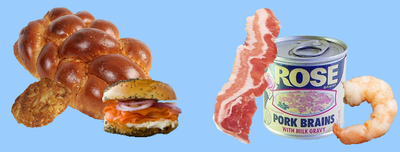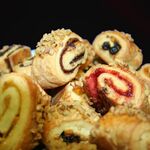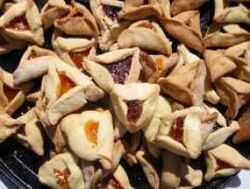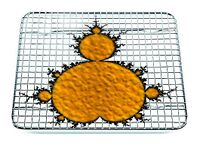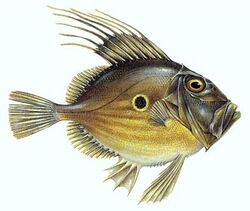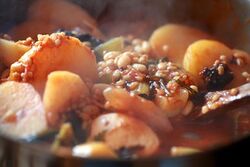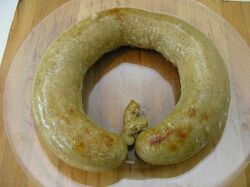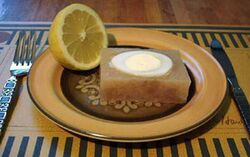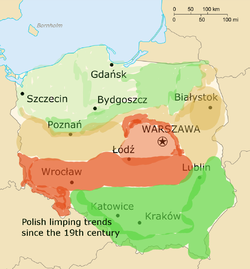Jewish Cuisine
“Don't go into the kitchen, children! All of the dishes are for the guests, not for you shmendricks”
Introduction
Article 153/3 of the Geneva Convention, dealing with the usage, proliferation and defense against Biohazard grade materials has been conducting ongoing research over the last 17 years to cover the wide issue of the so called "Jewish Cuisine".
This clinical research has been conducted according to the standard clinical trial-and-error methodology, including two test groups and a control group. Some of the experiments include:
- Single exposure to a single ingredient of "Jewish Cuisine"
- Long term exposure to a single ingredient of "Jewish Cuisine"
- Short and long term exposures to mixed ingredients.
The effects researched included both physical and mental changes over a period of time. Within this document we shall try to convey concise recommendation and treatment options for each known item that is included under the "Jewish Cuisine".
Legend
Within this report you'll encounter various warning signs. In this section we will address some of them.
Overview and general recommendation
In general, Jewish cuisine is very much what one might expect from any sweet-toothed, stodge-loving ethno-religious group many members of which spent roughly half of their history in a part of the world where food is characterised by extreme flavour and the other half in one where food is characterised by consisting mostly of fat. Early Jewish life in the Middle East and later history in Northern Europe allowed the Jews to select all the least healthy dishes from both and combine them into a distinct style of their own, creating what is perhaps the most unhealthy style of cooking ever devised.
It is the firm belief of the review panel that Jewish cooking based on the above is to be classified as follows:
- Inclusiveness of recognized essential nutrients: 5/5 recognized groups + 2 unrecognized groups (see P'tcha).
- Long term accumulating cellular level damage: 4/5 (concentrated mainly in the mouth, liver, lungs and every possible orifice).
- Environmental Damage: 5/5 (based or residual gas quota (and overall implication over the "Greenhouse Effect") and expected defecation.
- Overall risk assessment - 5/5 EXTREMELY HIGH
Type 1: Grade A Biohazard material - "Appealing" Jewish Food
Article 252/z/3:Chollah (חלה) 

- Risk classification: negligible
- Short term affects: N/A
- Long term affects: addiction
- Normally consumed: during the Sabbath meal and holiday feasts.
- Food group classification: Bread & Pastries
History:
According to legend, the Hebrews were at one time without a legitimate king. An oracle predicted that the next man to enter Jerusalem driving an ox cart would become the ruler - which, it turned out, was a penniless man named Gordianstein who was immediately declared king by the rabbis (rabbis worked far more quickly in those times - nowadays, before getting anything done, they prefer to spend a minimum of at least several months discussing it first). So poverty-stricken was Gordianstein that he had not eaten during his long journey to Jerusalem and so very soon after his coronation when he became aware of the fabulous wealth now at his disposal he decided to bake a loaf of bread. For reasons unknown he took three strands of dough and tied them into an intricate knot. A passing wise man observed this and claimed that the knot was so ingeniously tied that nobody would ever be able to unravel them - wishing to put this to the test, Gordianstein gathered together all of the most intelligent people to be found within his kingdom but, just as the wise man had said, not one of them could figure out how to untie the knot.
This proved to be a problem because now nobody could figure out how the bread was to be eaten - it was far too big to be placed into the mouth, chewed and swallowed whole; so it looked like the king would have to remain hungry while someone cooked something else for him. However, just as they had all given up trying to solve the problem a young man named Alexander entered the palace. He examined the knotted loaf for a few minutes but did not touch it, causing at least one of the older wise men present to make some comments on declining educational standards and how the youth of the day seemed unable to carry out even basic mental exercises without the aid of their fancy newfangled abacuses. Just as it seemed the knot had defeated him too Alexander pulled out his sword and cut the loaf neatly into several slices, allowing Gordianstein to spread them with honey and enjoy his slightly delayed snack.
The bread became known as chollah and to this day Jews around the world bake intricately knotted loaves to remind themselves of this period in their history. The term has also entered the English language as a metaphor for any seemingly-intractable problem that is eventually solved with a single, decisive and often spur of the moment action - "cutting the Gordianstein Chollah."
- Risk classification summary: Approach with caution.
Article 254/z/3:Rugelach (רוגלך) 

- Risk classification: Elevated
- Short term affects: Sugar rush
- Long term affects: addiction, sugar poisoning, massive organ failure, obesity.
- Normally consumed: during the Sabbath meal, holidays and times of general distress.
- Food group classification: Bread & Pastries, lethal desserts.
History
Rugelach is a cake typically eaten at Rosh Hashanah, the Jewish new year which Jews around the world use as an excuse to eat types of food that cause you to gain a pound in weight with each mouthful (provided the Jew then atones for his/her gluttonous sins by swearing to join a gym, the added weight will be lost at Yom Kippur[1]). Made of a mixture of sugar, flour, sugar, nuts, sugar, cream cheese, sugar, some sort of sugary preserve such as apricot jam and sugar, each piece of rugelach has enough calories to kill you. Only Jews highly experienced in the consumption of dangerously sweet Jewish cakes can eat more than a few crumbs per day without ill effect.
- Risk classification Summary: post mitigation plan is necessary.
Article 264/z/3 Hamantash (המן־טאַש), sometimes referred to as: The Ears of Haman (אוזני המן) 

- Risk classification: Snarling
- Short term affects: Disappearance of Persian neighbors from the nearby borough.
- Long term affects: Ahamadinijadism
- Normally consumed: during Purim and election periods in Iran.
- Food group classification: Man-made pastries. Literally.
Contrary to common belief Jews are big fans of cannibalism, a practice often considered morally reprehensible in the non-Jewish world. Since the old blood-of-a-Christian-child-in-the-Passover-matzah "scam" was identified by vigilant Christian authorities (which caused a number of niggling problems for Jewish communities around the world) Jews have been satisfying their cannibalistic desires each Purim when they eat the ears of Persian people which they often flavour with poppy seeds.
While believed to be just a symbolic pastry, reminding the Jewish folk of the evils that were carried out by the Evil Persian Haman, historic documentation showS that sometimes after the fall of Sparta, the Jews have reverted to acts of sporadic revenge against innocent Persians. Gangs of vigilante Jews were documented grabbing Persians off the streets. The horribly mutilated bodies were later recovered ear-less.
Pastry you say? Poppy seeds you say? Sweet dessert you say? Human meat we parry. Earwax we declare. Don't let your guard down, Persians, we conclude.
- Risk Classification Summary: Otitis to be expected.
Article 258/z/3 Kreplach (Yiddish:קרעפּלעך) 

- Risk classification: Variable
- Short term affects: Variable - satisfaction to extreme state of dispair over the maker's opinion of you
- Long term affects: See above
- Normally consumed: In times of poverty
- Food group classification: Noodly type things in soup
Small dumplings, often served in soup, very similar to Chinese won-ton dumplings only not usually made with pork/dogs etc. The amount and quality of meat found within each kreplach varies from at least an ounce of minced steak if your mama made them to a tiny, hard lump of gristle if your mother-in-law made them. Always prefer your mother's. Never admit to your mother-in-law that hers taste like a lump of gristle.
- Risk classification summary: Investigate contents closely prior to consumption procedure.
Mandelbrodt 
The humble almond has long been considered far more desirable than one might suspect, considering as how it's little more than the inside of a plum stone. However, its sweet, nutty flavour has long made it popular among those with a well-developed sweet tooth, such as most Jews. Indeed, it was so popular among the Jews of medieval Eastern Europe that the ruling classes placed a punitive tax upon anyone considered to look a bit Jewish that attempted to purchase them due to their belief that all Jews were rich and their need to raise funds for popular medieval activities such as war, burning witches and so on. This led to Jews soon finding themselves unable to bake the almond bread that they considered a delicacy.
One such Jew, a mathematician named Moishy Goldberg, decided to put his considerable genius to the task of developing a new way that the bread could be made using just one single almond. First, he ground the nut to powder, added a similar amount of flour and then he added his secret ingredient. From a small bottle, he mixed in a few drops of a formula he had devised himself: .
When baked, the bread began to rise, growing in size - yet, no matter how much the surface area increased, its perimeter never expanded beyond the original diminutive dimensions. Thus, Goldberg was able to bake a loaf of bread with infinite surface area and volume, using just one almond and a spoonful of flour. That one loaf proved to be enough to feed everyone in his shtetl; including "Big" Boykhvetig Brownstein, a noted circus trencherman.
Type 2: Controlled substances with export limitations to the Western Hemisphere
Some traditional Jewish dishes have names that make them sound exotic and tasty, but are actually boring. Examples include slishkes (potato dumplings that taste exactly the same as any other type of dumpling - ie; of nothing and dust), matzoh (basically no more than a giant cream cracker. The box they come in has more flavour), latkes (exactly the same as potato waffles) and tzimmes (chopped carrots - possibly the biggest rip-off of them all). It is believed that lazy Jewish mothers invented these names, designed to make the food sound interesting, in order to keep their "loving matriarch" image while allowing more time to be spent shopping, meeting friends, eating sufganiyot in coffee shops and drinking vodka (which is what my mother does all day).
Feinkochen (Codename unknown)
Sounds exotic, but is actually just an omelette with few terrorist applications other than localised and minor gas attack. However, Shmuely Rosten, a 38-year-old rabbi from Munich, found that the term led him into a very exotic situation during a visit to a London colleague in 1987. Walking through North London, he realised his stomach was rumbling and decided that a plate of feinkochen was the very thing he needed to tide him over until his evening meal. Not knowing the English term, he asked a passer-by in the street where he might be able to sample some English feinkocken. The passer-by informed the rabbi that he knew a place where very feinkochen indeed could be had, and led him down a shadowy dead-end street. It was not until they reached the end of the street, away from the attentions of passing police officers, that Rabbi Rosten discovered the passer-by was a male prostitute and realised events were about to take a distinctly non-kosher turn.
Article 292/z/3 Latkes (Hebrew:לביבה) 

Latkes are pancakes made from grated potato fried in oil, traditionally eaten during Hanukkah. Although superficially similar to a potato waffle, the production of one latke requires more oil than is necessary to complete a thousand-mile journey in a Hummer, most of which is soaked up into the food during the frying process. According to historians, when the Maccabees ignited a latke in the Temple after their defeat of the Seleucid Empire in ancient times, its oil content was so high that it miraculously burned for eight days and nights. A latke dropped overboard from the Israeli gefilte fishing trawler "Yentl Rosenberg" in 1992 caused an oil slick covering some 600 square miles of the Bering Straits and resulted in the deaths of several million seabirds.
Type 3: Controlled proliferated substance - "Less than appealing" Jewish Food
Article 199/z/3 Shmaltz Herring (Hebrew: דג מגעיל Yiddish: עקלדיק פֿיש) 

Manage to eat a bowlful of gefilte fish without any ill effects? Had an argument with your stomach and want to teach it a lesson? Attack it with a jar of shmaltz herring to let it know you really mean business.
It remains unexplained how Jewish cuisine - which has given the world such culinary delights as chollah, rugelach and (some) kreplach - can also have been responsible for shmaltz herring which, in a 2004 poll to find the world's most disgusting food, achieved a 99% share of the vote[1]. To make your own shmaltz herring at home, simply fillet a very fat herring and then place into a jar containing a mixture of brown sugar and chicken fat. Leave in the jar for six months, then throw into the trash and find something fit for human consumption instead. Either that or pickle your herring instead and use it make forshmak salad, which has one serious advantage over shmaltz herring - you can eat it without feeling nauseous for a month afterward.
The term shmaltz, technically meaning chicken fat, is used in Yiddish and English to indicate excessive sentimentality. However, when applied to herring, it indicates excessive disgustingness.
- ↑ 100 people polled. The 1% that did not vote for shmaltz herring reported that he had, on one occasion, been forced to eat feces by bullies while at school, and decided that was even worse - however, he admitted to doing so only after the considering the issue for some hours.
Article 286/z/3 Shakshuka (Hebrew:שקשוקה) 
A popular dish in Israel comprising of chopped tomatoes, paprika, tomato puree, oil, eggs and anything else you happen to find in the cupboard, shakshuka is widely rumoured to be a highly-effective cure for hangovers in much the same way that walnuts were once used to treat headaches due to their resemblance to the human brain and liverwort to treat liver conditions due to its visual similarity to that organ (a similarity noted only by those who have never seen a liver. The plant has leaves and is green, for a start. Human livers do not have leaves and are not green - not even George Best's) - an archaic branch of medicine known as "association" which states that any plant resembling a part of the human body will successfully treat any disorder of the body part it resembles.
Since hangovers, resulting from over-consumption of alcohol, affect not one but a multitude of body parts and there is no plant that bears any visual similarity to all of them, medieval Jewish doctors strove to come up with an effective remedy. Eventually, they hit upon the revolutionary idea of formulating an edible substance that, instead, resembled one of the most obvious symptoms and products of a hangover - vomit.
Type 4: Lethal substances banned for usage in 143 states and territories
Article 153/m56/p6 Kenidalach (Yiddish:קניידלעך) 


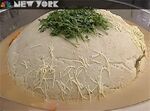
“Ah, kenidalach - to eat it or to avoid it? Often the subject of long internal debate, I find.”
- Risk Classification: Serious and prolonged, in worst cases permanent
- Short-Term Effects: Third-degree burns to mouth and face
- Long-Term Effects: Extreme pain, chewed woodwork, dire shortage of available lavatories
- Normally Consumed: Surprisingly often, considering the above
- Food Group Classification: Reinforced cement cast in large and awkward shapes combined with thermosetting adhesive
While being "only" balls of Matzoh flour, military historians believe that the reason Egypt hasn't tried to invade Israel in the last few decades is not due to the peace treaty of 1979, but fear of what might happen if anybody that eats kenidalach in large quantities were to be pierced by a bullet - estimates vary from severe but localised damage to nuclear winter causing crop failures throughout the Middle East, Eastern Europe and North Africa following the release of enormous quantities of fecal matter into the atmosphere; based on estimates taken when Joe Cohen, a 20 year-old resident of Sderot who had partaken of the notorious dish just once, built up such excessive rectal pressure that his lower torso exploded and destroyed several hundred recently-irrigated square kilometres of the Negev desert - an explosion originally blamed on Hamas.
One thing that is beyond doubt is that, consumed in even microscopic quantities, kenidalach results in serious constipation. This has been known to cause serious problems for United Nations espionage listening posts situated throughout Israel and other Middle Eastern states, where electrical monitoring equipment has frequently been known to register the deep groans of abject intestinal agony emanating from Israel following Passover as acoustic evidence of an Iranian nuclear weapon test.
To date, cholent is the only known antidote and has been shown to be remarkably effective - however, patients must be administered the antidote in strict rotation, no matter how much they are suffering, as were treatment of the entire Israeli population to take place over a period of any less than several years the sudden deposition of so much highly dense material (kenidalach-affected feces is estimated to have a greater density than a white dwarf star) within an area as small as Israel would upset the Earth's balance and cause it to adopt a highly eccentric orbit, possibly sending it into the sun. Doctors in Tel Aviv have reported some limited success with mechanical, rather than chemical (cholent), treatment; finding that armoured D9R "דוב" bulldozers borrowed from the IDF can be used to clear the most minor kenidalach symptoms.
Risk Classification Summary: 100% certainty of severe debilitating ill-effects, avoid at all costs
Article 250/z/3 Jewish Fighting Bagels (Yiddish:שלאָגן זיך בייגל) (Hebrew: כעכי לוחמה יהודיים)
History
It is only during the last century that bagels have become popular as a food, having been invented in the 2nd Century BC as a form of weapon and used against the Romans with great effectiveness during the Bar Kokbah Revolt of 136-132 BC. Military historians have studied the properties of bagels and discovered that the distinctive aerodynamic shape makes them a devastating and lethal device over the short-to-medium ranges that characterised ballistic warfare in ancient times, a fact supported by recently-discovered texts composed by a hitherto-unknown Roman scribe named Reperio Repono:
| “ | Those few centurions upon whom Minerva has granted sufficient favour as to allow safe return from Judaea, where Rome has long been engaged in conflict with the Jews, tell tales of fighting implements possessing such efficacy that our finest tactics and defensive measures are of little or no use against them. Chief amongst these is the terrible Jewish Fighting Bagel, an instrument that is formed from a granite-like dough first boiled and then baked to achieve immeasurable hardness. This cruel object is cast like a discus and is often affixed with deadly shards of matzoh bread about its perimeter so that no shield nor armour can halt its progress toward the victim's flesh, whereupon it never fails to bring about crippling injury and - in a majority of instances - death. Even without the matzoh, a Jewish Fighting Bagel expertly cast as is the custom among these people can stave in a skull as efficiently as a boulder XX minae in weight[1], such is their density and mass. | ” |
Modern Usage
Fighting Bagels fell out of use during the 19th Century when it became apparent that their usable range - up to around 1km - had been outclassed by modern field artillery and mortars. However, they were once again used in the Warsaw Ghetto Uprising of 1943 when, combined with highly-explosive nitro-lox[2] they proved to be remarkably effective against German armoured vehicles and tanks.
Subsequently, Fighting Bagel technique was developed for the Israeli Defence Forces by Imi Lichtenfeld and is now taught to all members and to an increasing number of students around the world. Fighting Bagel artists are quick to differentiate themselves from martial artists and to emphasise the contrasts between fighting sports and their own area of expertise, pointing out that there is no Fighting Bagel governing body as is the case with karate, Muay Thai and so on, no standard uniform and no official competitive championships. Fighting Bagels have been used extensively during all of Israel's conflicts and have proved to be of great value to IDF Special Forces and Mossad agents throughout the world.
Article 2512/Z/Z: Gefilte Fish (Hebrew:דגים ממולאים)(Yiddish:גפילטע פיש) 

- Risk classification: Fishy
- Short term affects: Uncontrolled urges to burst into Hora dancing.
- Long term affects: Undiluted hatred towards carp and humanity in general.
- Normally consumed: New Jewish year, Passover and in every occasion your children misbehave.
- Food group classification: unholy jelly meets the piranhas of the Amazon.
.
The ideal of the Jewish family gathering over a whole oven-baked-properly-spiced fish went horribly wrong sometime during the Middle Ages. If just before the time of the Black Plague, the dinner table of Jews would host a party of Blue Cod, John Dory and the Swordfish. The Black Plague not only diminished the number of available fishermen and severely disrupted the fish trade, it also caused the fish themselves to steer away from the murky European waters. With empty stomachs and desperate to continue the Sabbath meal tradition, the Jews invited a new guest to their table.
And this new guest was quite different to the sleek, elegant fish that were the guests of honor in the past.
It was Carp.
Yes, that ugly squishy feces-eating monstrosity.
"THIS!" said one smart-ass Jew, "THIS would be a good main dish for the Sabbath meal. Not only as it's cheap[1], but also it will allow us to atone for our sins and remember the fallen temple of Jerusalem!"
And so the ages came and went and the Jews were feeling miserable with their Sabbath meals [2]until along came yet another smart-ass Jew who said, רבותינו, הגיע זמן קריאת שמע של שחרית [3]. Let us take this stale piece of dead fish sitting on our table and VIOLATE IT TO THE EXTREME! Let's...let's...MIX IT WITH THE MOST IMPROBABLE INGREDIENTS! Let's...let's...MASH IT BEYOND RECOGNITION! Let's MIX IT WITH ALMONDS! ONIONS! STALE BREAD! EGGS! and as a final blow let's mix it with MATZOH BREAD!"
The idea was adopted enthusiastically all over the Jewish world with some of the Hasidic streams adding two important variants:
- Carp stock - the water in which the carp is being cooked crystallizes into..err...err...carpy goo. And so we will put this goo on top of the Gefilte Fish to remind us of the 11th (less known) commandment: thou shalt never haveth jelly. Ever. [4]. [5].
- The carrot - and yes, it is as ominous as it sounds. Consumers of Gefilte Fish must now carefully balance a single carrot on top of the carp stock that lies on top of the Gefilte Fish. The single carrot symbolizes the blazing eye of God looking over the Israelites as they've crossed the Sinai Desert on their way to the Promised Land. [6]
- The horseradish - some Hasidic streams tend to drown their already-dead Gefilte with ungodly amounts of bright red, extremely hot horseradish. It is said that the horseradish will burn off up to 70% percent of the taste buds in one's mouth, therefore allowing the consumption of the Gefilte to become a more vague experience, taste-wise. Some people just burn off their tongue with a blowtorch prior to attempted consumption.
- ↑ Because no one wants to get anywhere near that mutation of a fish
- ↑ as they should, the bastards
- ↑ gentlemen, it's time we really fuck ourselves up the wazoo
- ↑ being hospitalized after a severe operation with nothing to eat other than jelly does not mean you can have jelly. Don't you go eating jelly now.
- ↑ The carp stock is not considered to be Jelly. You're not getting away that easily
- ↑ it also helps to finish all of the carrots just sitting around the house. There's nothing really you can do with all those carrots
Article 251/s/453a: Cholent (Yiddish:טשולענט) 





“Cholent keeps you going...and going...and going...”
- Risk classification: Critical
- Short term affects: nausea, severe diarrhea, dehydration, pulmonary emphysema, enlarged bladder, kidney stones.
- Long term affects: addiction, brain aneurysm, cerebral hemorrhage, messianism, The China Synfrome (or the bodily equivalent thereof), choking on own bodily emissions, liver failure, lungs failure, heart failure, general failure, bad syntax or file name.
- Normally consumed: during the Sabbath meal especially during winter time, being a comfort food [1]
- Food group classification: Lethal Goo.
- ↑ Ha!
History
Originally created as food for the poor religious people, based on cheap ingredients that can be cooked overnight, thus not breaking the "thou shalt not light fire on a Sabbath" rule, the Cholent quickly transformed into the big bad wolf of the Jewish kitchen. No longer food for the poor and devout, the Cholent is now the Haute Cuisine of the rich and the famous, frequently used by the Jewish nobility as a highly potent way to get rid of their mortal enemies.
The basic brew of Cholent normally includes beans [1], wheat, barley, chickpeas, potatoes, boiled eggs, meat, chicken, more meat and the ominous Kishke. All the above are then placed in a huge pot and cooked overnight [2] The result is brown, delicious and quite deadly.
As a result of the highly gaseous ingredients (beans) alongside potent accelarents (more beans) mixed with anti-digestive agents (chickpeas, wheat, potatoes and eggs) the untrained consumer of the Cholent may suffer severe health issues ranging from indigestion, bowel blockage, kidney failure, multiple gas emissions and even death.
The greatest advantage of the Cholent as an assassination tool comes primarily from the fact that all of the above health issues are not evident up to a few hours following the consumption of Cholent, thereby allowing the assassinating party time enough to establish adequate alibi.
Notes
It is believed that the first recorded incident of assassination by Cholent was done by the Rothschilds, during a specially heinous trade dispute with the Strausses.
As of 1991, the Cholent has been placed on the list of controlled substances by the International Criminal Court in The Hague.
Since Cholent comprises chiefly of high-protein substances such as beans, it is believed to be why all Jews have the physique of Olympics-class weight lifters.
- Risk Classification Summary - Run and hide.
Supplemental: article 214/aa/ichs: Kishke (Yiddish:קישקע) 
- Risk classification: Critical
- Short term affects: extreme gagging reflex, Crohn's Disease, spontaneous outbursts in fluent Yiddish.
- Long term affects: irreversible brain death, reversible (two sided) hernia.
- Normally consumed: As part of a Cholent dish (see above)
- Food group classification: Haggis from hell.
The Kishke is one nasty bit of work. Imagine eating all sort of nasty stuff [1] being mixed with even nastier stuff [2] all being fried together.
Then imagine all this stuff being stuffed into cow intestines.
THEN imagine this unholy combination being shoved into a steaming pot full of Cholent.
The Jewish version of the immaculate Haggis typically brings down the helpless eater to his/her knees (we're not saying we eat this stuff, we're just saying that it exists). Originally used as a double action leash - both for securing pets and house animals and as a storage device for groat, it was rumoured that a clumsy rabbi managed to drop the Kishke into a pot of Cholent while trying to stop his dog from running away from the pot. The results surprised the rabbi and the Kishke became, as a result, an ungodly abomination rather than just a minor disturbance.
From that day on, the Kishke has become an inseparable part of the Cholent, winking devilishly from the Cholent pot, promising riches and stomach aches beyond your wildest imagination.
- Risk Classification Summary - It's the end of the world as we know it. And I'm far from fine.
Articles 252/s: Matzoh Bread (Hebrew:מצה) and 252/zz: Matzoh Shmurah (Hebrew:מצה שמורה)


History
The Matzoh bread was created, according to popular belief, due to the Israelites being in a bit of a hurry to flee Egypt thereby not waiting for their bread to rise. The result was Matzoh bread.
Post-modern historians tend to agree that it may have been a tragic mistake by one of the house workers of Moses who, due to the speed with which the Hebrews fled Ancient Egypt, accidentally placed a concrete slab into his grocery bag instead of the unleavened bread.
Later on, some of the major Talmudic scholars also ordered the Matzoh to be consumed as a sign of repentance and the resulting bowel blockage symbolizes the siege of Masada.
If you'd like to imagine how it would be to consume this Jewish delicacy, conduct the following steps:
- Take a thick slice of warm, freshly baked bread.
- Spread an even layer of butter on bread.
- Inhale deeply the nice smell of fresh bread.
- Drop bread on floor.
- Step on bread.
- Repeat previous step 5-7 times.
- Get your mother in law to repeat previous step 5-7 times
- Put stepped upon bread in the sun for 14-23 days
- Retrieve bread
- Pour 23-30 fl.oz. of cement over bread
- Wait 21 days
- Consume
- For a less time-consuming method, follow the above until you reach step 4. Then simply throw the bread away and eat the floor instead

The Matzoh Shmurah variation, (also known as medical grade matzoh) is a type of highly refined, super-strength matzoh; often described as being to standard matzoh what crack is to cocaine. Produced by means of an extremely technical and detailed process, it is regarded by the US Food and Drugs Administration as being one of the most addictive and pricey foodstuffs currently on the market and is believed to cause some ten million hospitalisations per annum (chiefly for chronic constipation).
The name, meaning guarded, is given because the high-price flour from which the matzoh is made is closely guarded by armed soldiers at all times during production. These well-trained guards are often disgruntled Israeli Defence Forces troops, recruited by shmurah gang leaders and unable to resist the lure of the enormous rewards offered by the enormously wealthy shmurah baron rabbis that control production.
Around 98% of all matzoh shmurah originates from Israel's lawless Northern Tribal Province where it is thought some 39,000 tonnes are produced each year, much of it destined for Western markets where shmurah addiction is a major problem in urban areas - the United Kingdom has some 295,000 registered addicts whereas the USA has around 5,275,000. Possession and supply of shmurah is unlawful in most nations, with penalties ranging from heavy fines to life imprisonment. In recent years, methods employed by Customs and Excise to detect the illegal transportation of shmurah have been greatly improved; however, as demand remains high, this has led to an increase in small and medium scale domestic production of varying quality. This realisation has led to widespread calls for it to be decriminalised and made available on prescription from a doctor for those addicts who register and agree to submit to treatment since a large portion of shmurah-related deaths are caused not by the product itself but by impurities ("street shmurah" - ie; that sold to addicts by dealers - which has often been cut with other substances, anything from flour to bleach powder is used; also, the ingredients may have come into contact with water for more than eighteen minutes - a factor known to cause deadly chimutz-related karet disease) or due to the violent nature of shmurah suppliers.
Article GGG/121!: P`tcha (Hebrew:"רגל קרושה") 


- Risk classification: Das Ende ist nah
- Short term affects: choking, gagging, leprosy.
- Long term affects: Weetabix addiction, loss of sexual appetite, loss of appetite, loss of will to live, spontaneous circumcision, spontaneous combustion.
- Normally consumed: Dark Kabala ceremonies
- Food group classification: OH MY GOD ARE YOU GOING TO PUT THAT IN YOUR MOUTH?!
The P`tcha (literally: "Coagulated Leg") is yet another Jewish delicacy attributed to reverse psychology efforts. While the global Jewish community has denied, for centuries, the pogrom allegations of "using a Christian child's blood for the preparation of Matzoh bread", it has been suspected since the early 19th century that the vehement declarations made by the heads of the Jewish community were a cover for a much darker setup.
For the Jewish community in the old country, hunger was a fact of life for many years. Meat, vegetables, bread and marshmallows were off limits for Jews. And the Jews were hungry. Famished in fact. And so the smart sons of Abraham went out looking for cheap and nutritious substitutes. Some diaries of Rabbi Josef Ragly surviving the ages state that:
| “ | ...And as I was walking around in the streets of Warsaw one freezing morning, my belly singing its song of hunger, I was confronted by a limping Polish goy. He was dragging one uesless leg behind him, all dirty and cross-eyed. And still! That no good an-alphabetical son of a borscht drinking Rahab looked down at me, a well respectable Rabbi who has been studying the Talmud since he was six years old? My tempers flared, and I dragged him by his working leg and pulled him into an alley. I kicked him several times when an idea overcame me. I cannot kill him, as this will be a crime against God, but I can certainly make use of a part of him he obviously has no use for. His leg. | ” |
The above said goy, one Grzegorz Krzysztof Szczepankiewicz, was later found dazed and confused hopping around the back alleys of Warsaw, missing a significant portion of his leg [1]. That event, in essence led to the dawn of the age of P`tcha.
The P`tcha, easy, cheap and yet very nutritious delicacy, contains - according to popular (non-Jewish) belief - calf and other beef-orientated hooves. In essence, just grab those innocent looking parts or remains of yesterday's feast, and boil them with spices and herbs. Easy enough.
However, this investigative committee has found a disturbing connection between the locations of Jewish communities and the percentage of limping Polish citizens, starting in the 19th century. The main area of the Jewish presence in central Poland (from around Warsaw and southward) is known in Poland as "Chromający Pas" (The Limping Strip), due to the high amount of limping Poles in those regions. No evidence has ever been found to confirm this allegation and the local Jewish community has always denied this claim vehemently.
- ↑ Anything below the waistline
Final Recommendation
It is the committee's opinion that categories 3&4 of the Jewish cuisine must be banned altogether on a global scale. Preparation, distribution and selling of any of the above items should be severely punished and dealt with by the International Criminal Court in The Hague. Items from Categories 1&2 should be allowed only in areas where a definite majority of Jews can be found (ie; Brooklyn). A set quota of monthly consumption should be set. Any proliferation outside the borders of designated areas for categories 1&2 should be severely punished by local governments.
| Featured version: 20 February 2010 | |
| This article has been featured on the main page. — You can vote for or nominate your favourite articles at Uncyclopedia:VFH. | |
